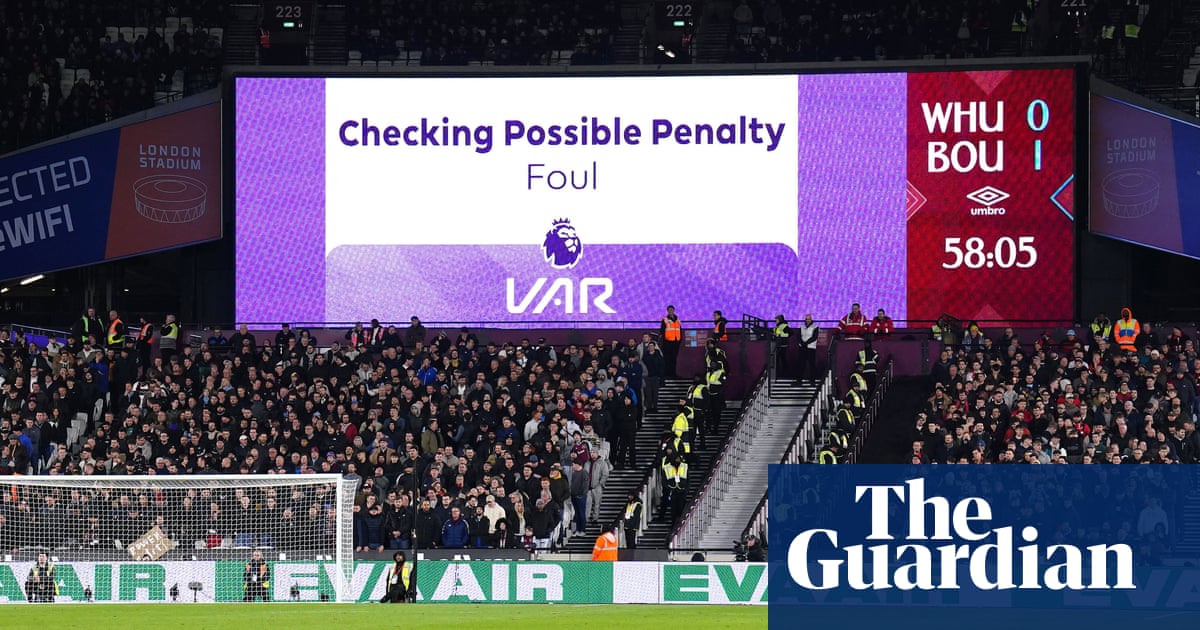
The Premier League has accepted improvements need to be made to VAR, acknowledging there are too many checks, they take too long and supporter experience of the video technology is “nowhere near good enough”.
The frank assessment by the chief football officer, Tony Scholes, comes as the league admitted it was not in a position to confirm the introduction of semi-automatic offside technology for next season, one key hope for cutting down decision times. Scholes did confirm, however, that the number of errors made by VAR had fallen this season.
“VAR is and remains a very effective tool in supporting the match officials on the pitch … but clearly everything in the world of VAR is not perfect,” Scholes said. “We’re aware of that and we know that we have work to do.
“There are two elements that I believe affect the whole reputation of VAR. [First] is the time that it takes to do the reviews, or to do the checks. We’re doing too many checks, we’re taking too long in doing them as well. It’s to a degree understandable given the level of scrutiny these guys are under, but the reviews are taking too long and it’s affecting the flow of the game.
“The second area where the VAR experience is poor is the in‑stadium experience for the supporter. It’s nowhere near good enough. We know it’s not. It affects supporters’ enjoyment of the game, and we know it needs to change.”
In that regard the league would support playing audio footage between VARs and on-field referees but Scholes said that was not imminent. “We are constrained in what we can do by Ifab [the body that determines the laws of the game] and Ifab is very clear at the moment we cannot use the audio. My personal view is that we’ll get to a point where both the video and the audio is played live and then played afterwards to explain the decision. How far away from that we are, I don’t know.”
Scholes said the average time taken to conduct a VAR check had grown this season, although he was unable to share specific figures. One process by which the decision-making could be sped up is through using software to automatically assess offside situations, before referring the assessment to officials. Uefa and Fifa have trialled semi‑automated offside technology with apparent success but Scholes said Premier League testing had provided more mixed results.
“It’s what we call the ‘edge cases’, where many things are occurring at once,” Scholes said. “You might have a lot of bodies in one place and it is the ability of the system to identify different parts of the body [that is of concern]. For the vast majority of cases there won’t be an issue but in our competition we want to be clear that we are not introducing something that will give us problems in other areas.”
Scholes said polling by the league showed a majority of fans were still in favour of VAR. He argues it is successfully performing its primary function of decreasing the number of errors by match officials.
“Before VAR 82% of the decisions [referees] made were deemed to be correct,” Scholes said. “In the season so far, that figure is 96%. VAR so far this year has intervened correctly on 57 occasions, 24 of those where VAR has intervened on a factually incorrect mistake on the pitch.” (With the other 33 subjective decisions such as reckless challenges.)
The league’s statistics also show there have been 20 VAR errors this season, down from 25 this time last year. Seventeen of these 20 errors, according to Scholes, came when VARs chose not to intervene to correct a referee’s decision. One such instance was the notorious incident in which Liverpool were denied a goal against Spurs last September.
Scholes said he found it disappointing when clubs made public letters of complaint to the referees’ body PGMOL over decisions. “Clubs are aware that Howard Webb and his colleagues are open to calls at any point,” he said. “Frankly I don’t understand why clubs feel the need to go public. I think it can sometimes be a little disappointing. We’ve all got a role to play in the perception [of refereeing] and perception can be driven by things that aren’t always borne out by the truth.”











